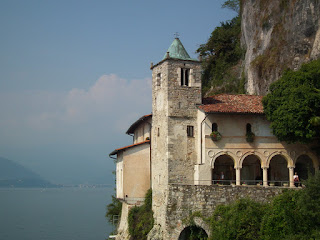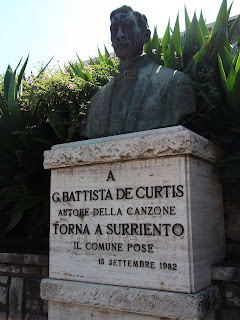Prolific playwright put the spotlight on corruption
Playwright and all round entertainer Dario Fo celebrates his
90th birthday today. He was born in Leggiuno Sangiano in the Province of Varese
in Lombardy on this day in 1926.
His plays have been widely performed and translated into many different languages. He is perhaps most well known for Accidental Death of an Anarchist and Can’t Pay, Won’t Pay. He was awarded the Nobel Prize in Literature in 1997.
 |
| Dario Fo (Photo: Gorupdebesanez CC BY-SA 3.0) |
Fo’s early work is peppered with criticisms of the corruption, crime, and racism that affected life in Italy at the time. He later moved on to ridicule Forza Italia and Silvio Berlusconi and more recently his targets have included the banks and big business.
He was brought up near the shores of Lago Maggiore but moved to Milan to study. During the war he served with several branches of the forces before deserting. He returned to Milan to study architecture but gave it up to paint and work in small theatres presenting improvised monologues.
In the 1950s Fo worked in radio and on stage performing his own work. He met and later married actress Franca Rame and they had a son, Jacopo, who also became a writer.
They moved to Rome, where Fo worked as a screenwriter, and for a while they lived next door to Roberto Rossellini and Ingrid Bergman.
When Fo and Rame returned to Milan they formed a theatre company and performed Fo’s plays at the Teatro Odeon in the city. His play Archangels Don’t Play Pinball was the first to bring them national and international fame.
Fo wrote and directed a popular television variety show, Canzonissima, but after one episode referenced the dangerous conditions faced by workers on building sites, it was censored. Fo and Rame walked out and were banned from Italian television for 14 years.
The writer has performed his most celebrated solo piece, Mistero Buffo, all over the world since he first introduced it in 1969, presenting it as though he is a travelling player in medieval times. The material he included relating to the life and times of Christ has been denounced as blasphemous by the Vatican.
Fo and Rame formed a theatre company operating outside the state system for which Fo wrote Accidental Death of an Anarchist, a play first performed in 1970 about the so-called 'accidental' fall from the window of a Milan police station of a man being questioned about a bomb attack on a bank.
Rame was subjected to a savage physical attack by fascists believed to be working on the orders of high-ranking Carabinieri officials, but she returned to the stage after two months to perform new anti-fascist monologues.
In 1974 Fo’s comedy Can’t Pay, Won’t Pay, about a consumer backlash against high prices, was first performed. Fo and Rame were later blocked from appearing in a festival of Italian Theatre in America. Fo’s play The First Miracle of the Infant Jesus was performed on television in 1987 but was condemned as blasphemous by the Vatican.
In the 1990s his plays addressed themes such as AIDS, the Gulf War and the economic scandal, Tangentopoli. More recently he ran, unsuccessfully, to be Mayor of Milan.
Fo continues to write and campaign about political and social issues and has also produced five novels. His wife, Franca Rame, died in Milan in 2013 at the age of 83.
UPDATE: Sadly, Dario Fo died a few months after this article was originally published. He contracted a serious respiratory illness and passed away in Milan in October, 2016, aged 90.
Leggiuno Sangiano, where Dario Fo was born, is close to the
shores of Lago Maggiore in the province of Varese in Lombardy. The area is
famous for the Hermitage of Santa Caterina del Sasso, a Roman Catholic
monastery perched on a rocky ridge overlooking the lake, which dates back to
the 14th century. It can be reached by boat or on foot by climbing down a
winding stairway and was declared a national monument in 1914. The hermitage is a short distance from Reno di Leggiuno, which has a marina and a number of hotels.
Travel tip:
Milan, where Dario Fo lived for many years, has a wealth
of theatres with a long tradition of staging a variety of entertainment. In
north west Milan, Teatro Dal Verme in San Giovanni sul Muro opened in 1872, the
Piccolo Teatro in Via Rivoli opened in 1947, the Teatro dell’Arte in Viale
Alemagna was redesigned in 1960 and Teatro Litta next to Palazzo Litta in Corso
Magenta is believed to be the oldest theatre in the city. The famous La Scala has a fascinating museum that displays
costumes and memorabilia from the history of the theatre. The entrance is in
Largo Ghiringhelli, just off Piazza Scala. It is open every day except the
Italian Bank Holidays and a few days in December. Opening hours are from 9.00
to 12.30 and 1.30 to 5.30 pm.


